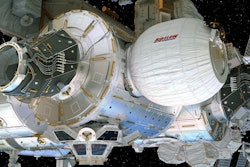This article originally appeared in IMPO's April print edition. To view the digital version, click here.
Apache Inc. broke ground on the 90,000-square-foot expansion of its main production facility in Cedar Rapids, Iowa, in May of 2015. Now, they’re nearing the finish line. According to CEO Thomas Pientok, the facility will be at fullscale operation by the end of April.
Apache is a conveyor belt, hose and rubber part manufacturer and certainly no stranger to expansion and acquisitions. Despite a tough economy for the industry, Apache recently opened a facility in Dallas and acquired a company in Portland over the past couple years, in addition to the expansion in Cedar Rapids.
Jill Miller, marketing and communications manager for Apache, describes how important these products are to society overall. Everything you consume, touch and eat has been involved with conveyors — from the very beginning at a manufacturing facility to the front end in retail.
“When you go to the grocery store, there’s conveyors running the groceries — but no one ever thinks about that,” she explains.
The $7 million expansion was announced in order to accommodate the company’s significant growth, as well as provide more workspace. The additional space will also aid with in-house testing of belts, says Gregg Hanson, vice president of sales.
“We’re definitely expanding and improving our testing capabilities,” he explains.
The expansion is so extensive that it involves moving every single piece of equipment, Hanson continues. The company nearly doubled the amount of doors at the loading dock from five to nine to accommodate increased input and output.
In addition to the extra 90,000 square feet indoors on the inside of the facilities, Apache added a canopy outdoors to cover the back area, where the extra rubber and materials are stored since they are not affected by weather. The 40,000-square-foot canopy has already greatly reduced the amount of unrelated work the employees did previously, such as shoveling snow to move the materials inside or drying them off from rain and moisture.
The facility has also seen an increase in automated technology, which Hanson says has impacted output positively has impacted output positively and helped to increase worker safety. helped to increase worker safety. Though there is widespread concern about automated technology replacing human workers, Hanson says there has been no effect on jobs at Apache. In fact, in the announcement of the expansion in December 2014, the company said the project would preserve 30 jobs and create 15 new ones. Those numbers are still on track, says Pientok.
Along with the increased use of automated technology and the concerns that it presents, there is a ubiquitous conversation in the industry about the manufacturing skills gap and the fear of being unable to recruit new workers to replace the older, more experienced workers.
Responding to the skills gap crisis, the company created Apache University, an internal program to focus on recruiting young individuals and training them internally.
Miller explains that one of the biggest challenges is attracting younger generations to the industry. But once Apache is able to gain interest, they choose to train internally since the necessary skills are not often taught in school.
Apache hosts junior high and high school students on tours to attract them to the company. The company previously hosted a former presidential candidate, Sen. Rick Santorum from Pennsylvania, to tour the Cedar Rapids facility and discuss the importance of manufacturing to Iowa’s economy in 2015.
Pientok, as well as numerous other employees at Apache, is involved with outside organizations that benefit both the company and brand while also giving back to the industry, he says. He was named president of the National Industrial Belting Association for 2016.
“Our involvement in these trade associations, and certainly the leadership track that I’ve been given the great opportunity to follow in the association, is clearly a commitment to the industry, and I want to give back to help the entire industry be stronger,” he explains.
As an employee-owned company, Apache emphasizes the importance of its workers. “When you walk in the front door here, you’re going to feel something different. It’s our people,” Pientok says.
Pientok acknowledges the tough economy that many manufacturers have struggled in and explains that Apache has had to strategically realign facilities in order to at least maintain topline revenue. Though the company ceased operations in Chicago and production in St. Louis, it has continued to expand and open facilities in places most beneficial to operations overall.
In addition, the company leased the facility to others while going through the expansion to not overwhelm expenses, Miller explains. Apache is very focused on carefully assessing their strategy, Peintok says.
“Frankly, right now we’re a well-oiled machine. I feel better about the team that we have in place today than I have in a long, long time — maybe ever,” he describes.
After the expansion is complete, Pientok says he thinks the company will “slow down” for a while, but they’re not finished growing yet. The goal is to always look at the long term and continue to make investments, even in a rocky economy, because being short-sighted will stint growth and hurt profit.
“What is our future? We want to continue to grow. We want to be a much larger organization than we are today — but we also have to be careful not to forget who we are,” Pientok explains. “Growth can cause a loss of your roots and a loss of what you bring to the market. So we need to make sure as we grow, we stay focused on our core and the value that we bring to our customer base and their customers.”






















